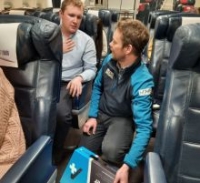MIME Technologies, a med-tech
spin-out from the University of Aberdeen, has unveiled a smart device set
to revolutionise how medical events are managed in the air - with the
potential to benefit the many thousands of travellers who fall ill on
flights annually.
Medical events in-flight are an increasing challenge for both passengers
and airlines as the population ages and more people fly with
long-term health conditions.
In a single year, flight diversions for medical reasons can reach 60
flights for just one major airline, costing between £38,500 - £464,000
per diverted flight. Four billion people currently travel by
plane annually, a figure expected to rise to 8.2 billion in 2037
(Source: International Air Transport Association).
Now, a multi-disciplinary team of physiologists, technologists and
aviation medicine specialists have created a new wireless technology,
named ‘Aiber', that provides fast and accurate support to cabin crew,
pilots and clinicians on the ground.
Allowing more informed decisions, it is applicable for a wide range of
medical events, ranging from burns and allergic reactions to potential
heart attacks in the skies.
Cabin crew are responsible for passenger care in-flight and receive
detailed and specific first aid training, refreshed annually. While
some airlines can call on clinical ‘on the ground' support, this is
not mandatory for all flights. Calling the ground can also be
difficult, requiring the crew to leave the patient's side to use
the on-board phone or existing headphone technology, which is prone to
serious challenges like noise interference.
Aiber is the first technology capable of ‘live' streaming a wide range
of passenger data to the ground, allowing real-time
digital communication between the crew, the passenger and clinical support.
Anne Roberts, co-founder & chief executive officer of MIME
Technologies, explains: "An in-flight medical event, even of a minor
nature, can be hugely stressful for cabin crew. Our affordable technology
guides them through their first aid training but, crucially, it live
streams medical event updates to the ground.
"This is hugely significant as it allows a more informed decision about
how stable a passenger is and whether the flight should divert
or continue. It allows cabin crew to stay by the
passenger's side throughout and, using AI, it automatically stores and
transmits essential information that can often be missed or only
recorded after the event.
"For the first time, clinicians on the ground will be able to follow,
in real-time, the deterioration or improvement of a passenger in the air
using wireless technology and the tech provides a seamless handover
to emergency services meeting the aircraft. We believe the technology will
help avoid unnecessary diversions but, more significantly, it will help
save lives by providing ‘eyes in the sky' on flights globally."
Developed with input from two of the world's leading airlines and
suitable for use by commercial airlines and business jets, the
technology can integrate wireless, clinical-grade, heart sensing
equipment; specifically designed for non-medical professionals like cabin
crew.
MIME recently completed field trials with a global aviation company, with
multiple commercial and business jet customers in the pipeline.
Alan Cowan-Moore, Curriculum Head, Travel and Tourism at City of
Glasgow College, was a member of cabin crew before going
into education. He said: "During my time as cabin crew, I
helped resuscitate a passenger who suffered a cardiac arrest. I was
anxious about the care I was providing, wondering if my efforts were
effective. Fortunately, I had the help of an off-duty doctor, but
many don't.
"Aiber offers a technological solution to support cabin crew in such
situations. The potential to reduce the need for diversions, through
effective identification of medical conditions, is of enormous
benefit for both customers and airlines.
"As an educator, I encourage our students to take a step back and see the
bigger picture. Access to this type of expert help has the potential
to reduce stressful situations but also result in lifesaving
outcomes."
Founded by Dr. Alasdair Mort and Anne Roberts, MIME Technologies
is located in Solasta House on the innovative
Inverness Campus. Supported by Highlands & Islands Enterprise,
the company was a Scottish EDGE winner in 2017. Additional awards
include SCDI's Excellence in Research & Innovation award. In
October 2019, the company received investment led by Equity Gap
investors and the Scottish Investment Bank.
Business Advice for all UK firms from starting a business to flotation
‘Eyes in the skies’ smart device set to revolutionise in-flight medical events

»
- Login or register to post comments
- Printer friendly version
- send to friend
Post Date: March 3rd, 2020






